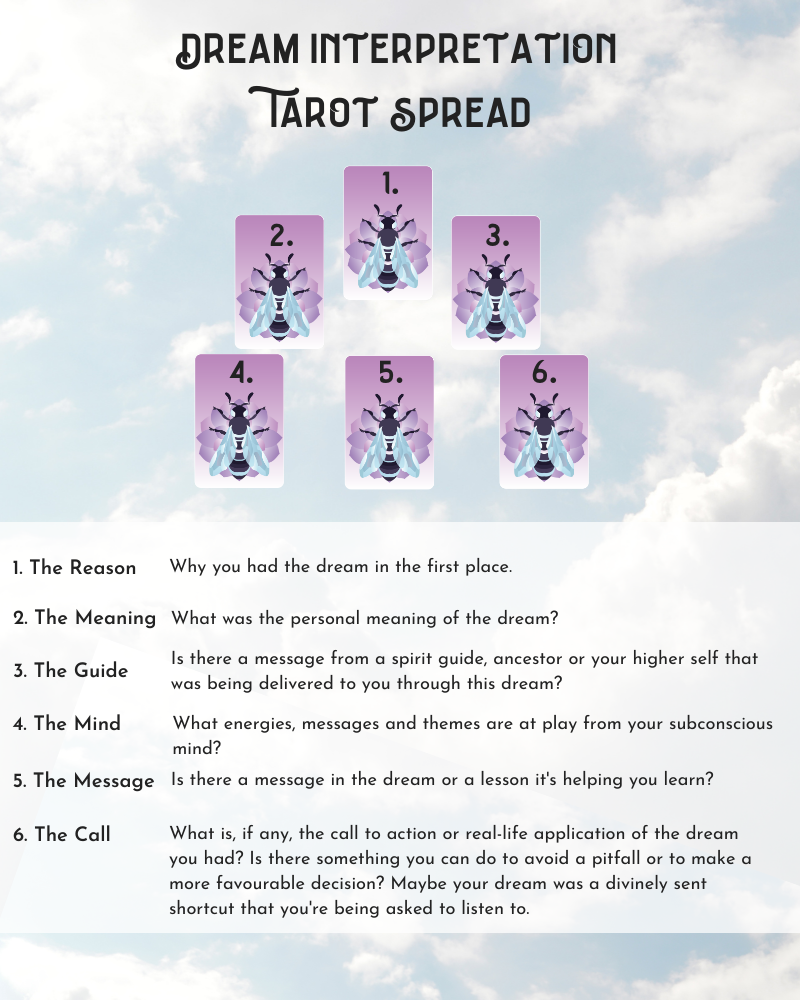Unravel the Hidden Meanings of Your Dreams – How Dream Interpretation Can Reveal Your Subconscious Desires

Do you wake up curious about the meaning and significance of your vivid dreams? You’re not alone. Dreams have captivated people for centuries, as different cultures believe they hold valuable insights from our subconscious minds.
If you’ve ever wanted to unravel the mysteries of your dreams and gain a deeper understanding of yourself, you’re in the right place. In this article, we’ll take a journey into the world of dream interpretation. By exploring the symbols, themes, and emotions in your dreams, you can discover hidden meanings to guide your personal and spiritual growth.
The benefits of dream interpretation go beyond self-discovery. By deciphering your dreams, you gain a powerful tool for problem-solving, creative inspiration, and clarity in your waking life. You’ll develop a closer connection with your subconscious mind and a unique perspective that can inform decisions, relationships, and well-being.
If you’re ready to explore the world of dreams, here are practical tips, techniques, and exercises to help decode the language of your dreams. You’ll uncover your deepest desires and fears and tap into the unlimited potential of this realm. Whether you’re a dream enthusiast or a beginner, this guide is your key to uncovering the treasures within. Prepare for an adventure into the realm of dreams by acknowledging their importance and discovering their meaning.
The Significance of Dreams

Dreams have always fascinated humans throughout history due to their profound significance. These nocturnal visions offer valuable insights into our subconscious mind and provide guidance or messages from our inner selves. The key reason why dreams are significant is their ability to reflect our deeper emotions and thoughts, often disguised through symbols or metaphors. By analyzing and interpreting these symbols, we can better understand our fears, desires, and unresolved issues, leading to personal growth and self-discovery.
Dreams play a crucial role in problem-solving and creative thinking. Great inventions, scientific breakthroughs, and poetic creations are often inspired by dreams and their symbolic representation. Writers, artists, and musicians harness the power of dream elements, transforming emotions and ideas into tangible creations. Dreams can act as a muse for innovative projects or artistic endeavors.
Dreams serve as a means of communication between the conscious and unconscious mind. When we are awake, rational thinking dominates, suppressing emotions and repressed memories. However, during sleep, the walls between these two realms weaken, allowing suppressed content to seep into dreams. This phenomenon lets us confront and process unresolved issues or traumatic experiences that we may have otherwise avoided. Analyzing recurring dreams or understanding dream patterns can aid in the healing and resolution of emotional wounds or conflicts.
The significance of dreams lies in revealing hidden aspects of our subconscious mind, fostering creativity and problem-solving, and bridging our conscious and unconscious selves. By embracing the messages and symbols in our dreams, we open doors to self-discovery, personal growth, and the resolution of unresolved issues, ultimately enriching our inner lives.
How to Remember Your Dreams
:max_bytes(150000):strip_icc()/how-to-stop-dreaming-about-work-5205196_final1-90329a406af0416d8006194fc5b1e8db.png)
To interpret and analyze dreams, you must first remember them. Dreams are often forgotten upon waking, but with simple techniques, you can improve your dream recall.
Keep a dream journal: Place a notebook or voice recorder by your bed and record your dreams as soon as you wake up. Write down as much detail as possible, including people, places, and emotions. This will improve dream recall over time.
Having a consistent bedtime routine can boost your dream recall. Try going to bed at the same time every night and practice relaxation techniques like deep breathing or meditation to prepare for sleep. Set the intention to remember your dreams while you sleep. This pattern of repetition can enhance dream recall and prioritize dream retention in your subconscious mind.
Here are some techniques to help you remember your dreams:
– Dream journaling: Record your dreams in a notebook or voice recorder.
– Bedtime routine: Establish a consistent routine to improve dream recall.
– Dream affirmations: Repeat affirmations before sleep to set the intention of remembering dreams.
– Morning reflection.
Take a moment upon waking to reflect on and recall any dream fragments. By doing this, you can increase your dream recall and gain insight into your subconscious mind. Some people may find it challenging to remember their dreams at first, but with practice, you can improve your ability to recall them.
Reflecting on your dreams can provide you with valuable information and help you understand yourself better. It’s a simple yet effective way to tap into your subconscious and explore the depths of your mind. Furthermore, by engaging with your dreams and pondering their meanings, you can potentially gain insights and solutions to problems or challenges you may be facing in your waking life.
To enhance your dream recall, try keeping a dream journal by your bedside. Immediately upon waking up, jot down any dream fragments, emotions, or images that you can remember. Even if the details are vague, write them down. Over time, you’ll find that you can recall more and more of your dreams and capture their essence in your journal.
Remember, each dream is unique and has its own significance. It’s essential to approach your dreams with an open mind and without judgment. Allowing yourself to explore the symbolism, emotions, and narratives in your dreams can lead to valuable insights and personal growth.
So, the next time you wake up from a dream, take a moment to reflect and recall. Write down whatever you remember and engage with the mysteries of your subconscious mind. You may find that your dreams hold the key to understanding yourself and the world around you.
Techniques for Dream Interpretation
Dream interpretation has fascinated people for centuries. Dreams can provide valuable insights into our subconscious and help us understand ourselves. However, interpreting dreams can be challenging. There are techniques that can aid in dream interpretation and unlock hidden messages.
One popular technique is keeping a dream journal. Writing down dreams upon waking captures fresh and vivid details. Having a record allows you to identify recurring themes, symbols, or patterns that may carry specific meanings. Analyzing your dream journal helps unravel the significance of the images and events in your dreams.
Analyzing emotions felt during a dream can provide clues to its underlying meaning. For example, fear or anxiety may indicate unresolved emotions or fears in waking life. Conversely, joy or happiness may symbolize fulfillment and contentment. By exploring the emotions in your dreams, you can gain a deeper understanding of your own emotional state.
Symbol interpretation is valuable in dream analysis. Dreams often consist of symbols with personal or cultural meaning. For example, a snake symbolizes transformation or healing, while flying represents freedom or escape. Consider the context of the symbol in your dream and how it relates to your experiences and beliefs. Consulting dream dictionaries or seeking guidance from a professional interpreter can help interpret symbols.
Dream interpretation is subjective. Dreams are unique and personal, reflecting one’s experiences, emotions, and subconscious. Techniques like keeping a dream journal and analyzing symbols offer meaningful insights. Exploring your unconscious aids self-understanding and unravels dream messages.
Impact of Dreams on Daily Life

Dreams shape our lives, impacting our emotions, thoughts, and actions. They provide insight into our subconscious, allowing exploration of fears, desires, and unresolved issues. They influence our mood and emotions, impacting how we feel throughout the day. A pleasant dream uplifts us, leading to a positive and productive day. Conversely, a nightmare or disturbing dream leaves us anxious and unsettled, affecting focus and performance.
Dreams often trigger insights and epiphanies, guiding our decisions and actions in waking life. Our mind freely processes information and patterns during dreams that may not be immediately apparent during the day. Inventors and creatives credit their dreams for sparking groundbreaking ideas and innovations, offering inspiration, problem-solving, and fostering creativity. These influences can profoundly impact our daily life and choices.
Finally, dreams serve as a source of reflection and self-awareness. Analyzing and interpreting our dreams provides a deeper understanding of ourselves, fears, and desires. This self-reflection enables positive changes in daily routines, relationships, and overall well-being. Dreams uncover subconscious thoughts and emotions that could be influencing behavior unconsciously, offering an opportunity for growth and development.
In conclusion, dreams profoundly impact our daily lives, influencing our emotions, guiding decisions, and providing self-awareness. Paying attention to and interpreting our dreams allows us to harness their power as a tool for personal growth and fulfillment.
Tips for Harnessing Dreams for Personal Growth

Dreams have always been mysterious and intriguing throughout history. Whether you remember them every morning or only occasionally, their potential for personal growth can be transformative. By tapping into the wisdom and insights dreams can offer, you have the unique opportunity to understand yourself on a deeper level, gain clarity, and make positive changes in life.
Key points for harnessing dreams for personal growth:
1. Pay attention: Be open to receiving messages from your dreams.
2. Keep a dream journal: This can improve dream recall and help identify patterns or recurring themes.
3. Explore symbols and meanings: Dive into the symbolism of your dreams to uncover messages and insights.
4. Reflect and integrate: Take time to reflect on your dreams and integrate any lessons learned into your waking life.
5. Seek professional guidance (if needed): If you struggle to understand your dreams or encounter persistent nightmares, consider seeking the help of a therapist or dream specialist.
Remember, your dreams can be a valuable tool for self-discovery and personal growth. Embrace them, explore them, and allow them to guide you on your journey towards self-awareness and fulfillment.
Harnessing your dreams can impact personal growth. Understanding yourself allows identifying areas for improvement, breaking harmful patterns, and creating positive changes in daily life.
To put insights into practice, keep a dream journal, remember dreams each morning, and pay attention to recurring symbols. Actively engage with dreams by reflecting on and analyzing their meaning. This journey is continuous, and delving deeper into your dream world reveals profound truths and transformative potentials.
Share your progress, insights, and experiences with others who are interested in dream interpretation. Engage further by reading more about dreams, participating in dream workshops, or joining dream interpretation communities. Embrace the power of your dreams and unlock the endless possibilities of personal growth they offer.


